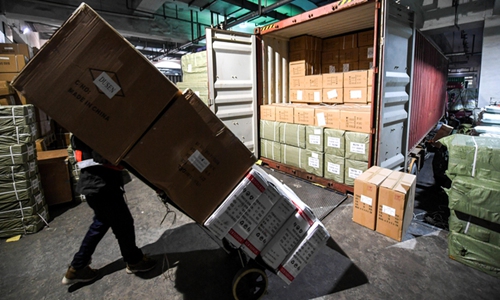HOME >> SOURCE
Yiwu entrepreneurs still wait for business to resume
By Xie Jun and Chi Jingyi Source:Global Times Published: 2020/2/11 20:23:40

File photo
As businesses across China struggle to resume work after a prolonged Lunar New Year holiday over the sudden coronavirus outbreak, Yiwu, a small city in East China's Zhejiang that is known as the world's largest small commodity hub, is still frozen for many businesses.
The city's largest wholesale market - Yiwu International Trading City, which should have been open on February 5 according to past practice - is still closed. Local factories are waiting for government permission to resume production, and businesses whose factories are located elsewhere are finding it more difficult to restart work because of traffic controls and self-quarantine requirements.
"To prevent virus risks, Yiwu factories aren't allowed to resume production unless permitted by the local government. My factories are still on hiatus and I don't know how long this will last," said Wang Hanyu, who owns a small invitation card factory in Yiwu that has about 10 employees and another factory in Wenzhou, a city about 200 kilometers away from Yiwu.
According to him, the Yiwu government has allowed dozens of local factories, mostly large companies from key industries, to resume production. Wang's Yiwu plant has also applied to resume production but has not received permission yet.
Yiwu-based industrial companies that are entitled to apply to resume production must prepare disease-prevention materials and make a detailed plan for preventing the virus including emergency management and logistics support, sources close to the Yiwu government told the Global Times.
Virus-triggered logistics disruptions are also becoming a headache for Yiwu businesses.
A Yiwu-based artificial flower trader surnamed Fang, who has two overseas factories, said that her business is totally suspended. Usually her company produces artificial flowers in the two factories, ships them to China for packing and exports them.
Now, one of her overseas factories, which is located in North Korea, can't ship products to China because of the epidemic, she said.
"If we don't shut down the factory in North Korea, we can't pay the wages and other costs. Production means a loss for us," she told the Global Times.
It goes without saying that the manufacturing halt would bring losses to business owners in Yiwu, who are still praying that the impact will be just temporary and everything will return to normal as soon as possible.
"If everything returns to normal in March, it would be like one or two months of losses for us. But if the epidemic persists, I can't make money this year," Zhang Jiying, who owns several umbrella stores in Yiwu, told the Global Times.
Wang also said that he has to suffer losses because of the manufacturing halt. "I can't fill unfinished orders and receive payment, but at the same time I still have to pay my employees and repay loans," he said.
However, experts were optimistic that although the epidemic would have a negative impact on Yiwu's business operations in the short term, it wouldn't change Yiwu's role as the heart of global small commodity trading.
Huang Beila, a research assistant at the Zhejiang Institute of Industry and Information Technology, said that as the WHO has declared the coronavirus outbreak as a global health emergency, Yiwu's small commodity exports face rising costs of inspection and quarantine.
"Besides, business is unlikely to be as good as before in the short term even after the markets open again," Huang said.
However, Huang predicted that Yiwu's trade would rebound in the second and third quarters after a first-quarter decline.
"International customers will still come (to Yiwu) after the epidemic is under control, as the domestic markets are so large. Yiwu products will also go out along with the Belt and Road Initiative," Lin Liwei, a professor at the Zhejiang University of Finance & Economics, told the Global Times.
Posted in: INDUSTRIES,BIZ FOCUS